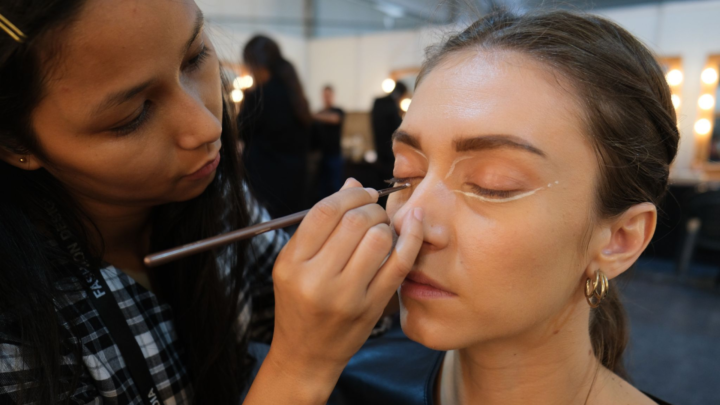Being an MUA is an exciting, creative career, but it can be super-competitive. The demand and type of work you get involved in can vary massively from place to place. You might be more likely to do TV and film makeup in cities like London, Manchester and Liverpool for example, or you might get asked to do a few more bridal looks if you live near an amazing wedding venue.
So where are the best places to be a makeup artist in the UK? I did a little bit of number crunching using Google Trends and social to work out searches and online conversation for key makeup artist search terms over 12 months, then I apportioned this by population size per city.
Let’s start with the results.
Where is the best UK city to be a makeup artist?
Here’s the UK cities with the most MUA searches per capita, starting from the place with the most searches per number of people in the city:
1. Belfast
2. Newcastle
3. London
4. Liverpool
5. Sheffield
6. Birmingham
7. Bristol
8. Leeds
9. Cardiff
10. Glasgow
11. Manchester
12. Edinburgh
It’s no surprise that Liverpool and London are towards the top, but I’m surprised how low Manchester is. The fact Belfast has pipped the top spot isn’t something I expected either.
Other UK MUA search stats
Want a little more info on what the search and social trawl of makeup artist terms showed up? This could give you some insights into how to run and market your MUA business:
- London had the most searches overall when you don’t apportion it by population size.
- March, May and June had the highest peaks in MUA searches overall.
- Quietest months were August, September and December (remember, this is searches – as in people looking for info, not booked appointments).
- Overall search demand is fairly consistent across cities, though there are absolutely peaks and troughs.
- The areas with the most MUA*city* hashtags used were London, Liverpool and Manchester, in that order.
- Local MUA keywords (think “makeup artist Belfast”, “wedding makeup Belfast”) aren’t that competitive, and if you think about search intent there’s definitely a missed opportunity there.
- Overall there are 80,000+ local MUA searches each year across the 10 cities above – this doesn’t include general “makeup artist” searches or other cities that aren’t on the list.
- There are more than 10,000 “makeup artist near me” searches every single month across the entire UK.
How did I work it out?
I started out by looking at the cities in the UK with the most, then digging out a ton of search data and using some formulas to apportion search trends by population. Here’s a little step by step.
- Get population data for the biggest cities in the UK.
- Check out Google Trends, search data and social media for terms like “makeup artist *city*”, “make up artist *city* and “MUA *city*”, along with key hashtags by city.
- Entered everything into a spreadsheet to get total search volumes and then adding in some formulas to divide the searches by the population and get to the bottom of where has the most searches per capita (I ran a few different formulas to get a variety of different stories from the data).
- I sense checked against social media for key makeup artist hashtags.
- Looking through the data I highlighted some key points in the data – things like where the most searches were, the highest search months etc.
The spreadsheet and search data collection is LONG, but it’s worth it to build up a stronger story that works for your brand.
Why bother with data?
Data like this can help you to pick up key insights for your business to support your strategy and business goals. It can help you work out new markets, where you spend your budget and give you ideas on the next steps for your business.
Another angle for data is to generate PR and content for your brand. Data like the stats above can be used in a lot of different ways, such as:
- Generate income.
- Feed into your marketing strategy.
- Social media graphics and posts.
- Email marketing.
- Add to your website or blog for SEO.
- Outreached as a PR piece to magazines, professional bodies and influencers in your industry to generate press coverage and brand awareness for your business.
- Position yourself as an expert/voice of authority.
You can also refresh stories with new data year after year, you can compare and contrast between different time periods or you can take a deeper dive into any interesting angles that pop up too.
Want data-led content like this?
If you’re looking for data-driven stories and content for your brand, get in touch with me for a chat about how we can work together.
You can also follow me on Linkedin where I share regular beauty industry insights, stories and stats.

